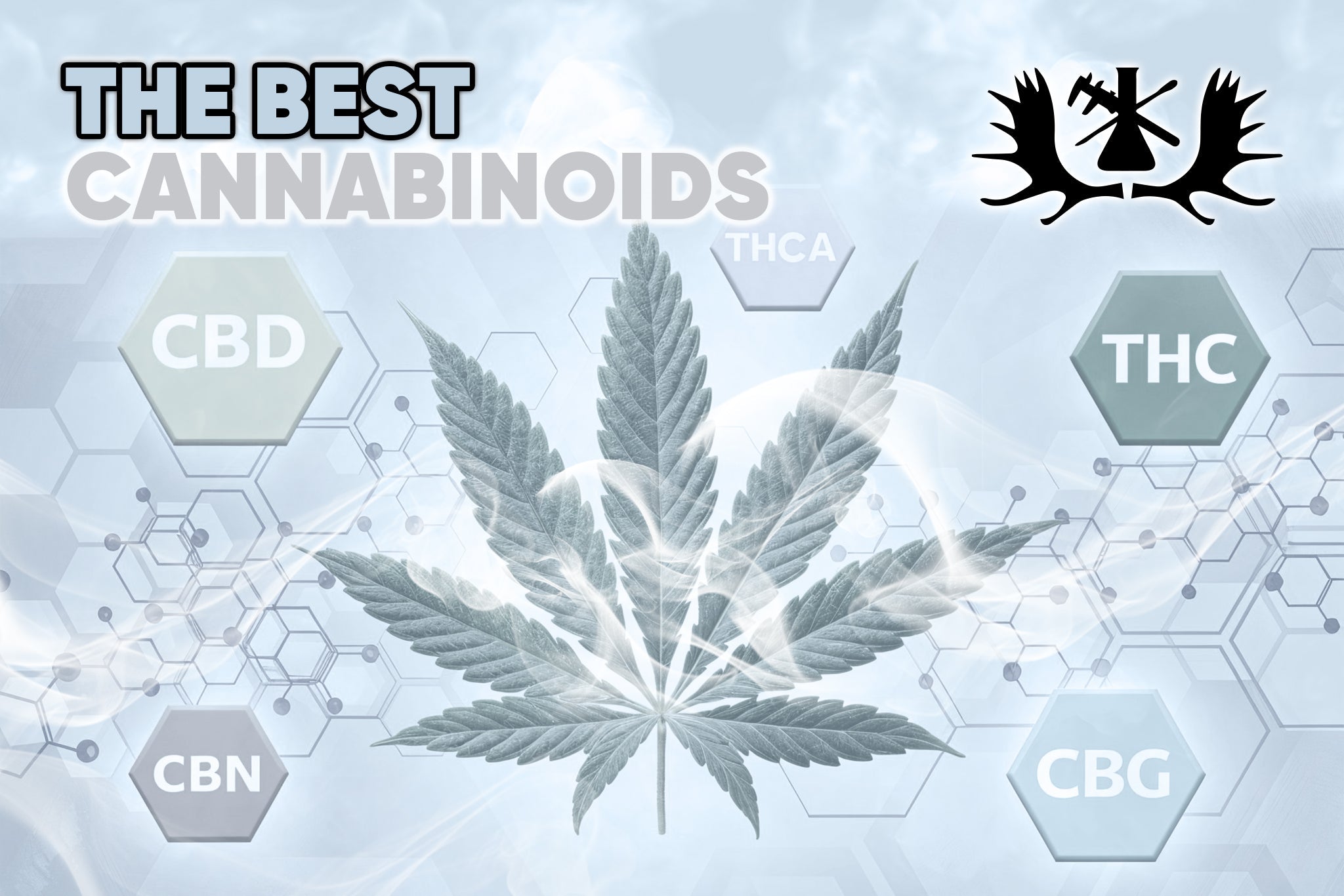The Best Cannabinoids In 2025

The word “cannabinoids” is popping up more and more these days—and for good reason. Whether you’re into cannabis for fun or exploring medical cannabis as a form of alternative therapy, cannabinoids are where the magic happens.
Cannabis plants naturally produce hundreds of chemical compounds. When you smoke, vape, or eat cannabis edibles, these cannabinoids interact with your cannabinoid receptors, helping regulate mood, appetite, sleep, and pain.
Most people know about THC and CBD, but there’s a whole squad of cannabinoids, each with its own potential effects and therapeutic applications. Let’s break down the best ones to know in 2025.
What Are Cannabinoids?
Cannabinoids are natural compounds found in cannabis. They form in the plant’s trichomes—those tiny, sticky glands on the flower—and are also known as phytocannabinoids.
Some cannabinoids are psychoactive, producing the classic “high” through their psychoactive effects, while others are non-intoxicating and potentially analgesic or anti-inflammatory. They all interact with the body’s endocannabinoid system, which includes CB1 and CB2 cannabinoid receptors located throughout the nervous system.
What are the Top 10 Cannabinoids in Cannabis
While there are more than 100 known cannabinoids, here are the 10 most important to know in 2025
THCA (Tetrahydrocannabinolic Acid)

THCA is the raw version of THC and the most abundant cannabinoid in cannabis. It is a precursor to tetrahydrocannabinol (THC), which is the psychoactive cannabinoid responsible for the “high” associated with cannabis use.
It’s found in fresh, unheated cannabis. It doesn’t get you high unless exposed to heat. When THCA is heated, smoked, or vaped (decarboxylation), it turns into THC.
Potential Benefits of THCa (raw)
- Anti-inflammatory
- It may help with pain
- Anti-emetic
- Neuroprotective properties
Benefits Of THCa (heated)
- relaxation
- euphoria
- giggly
- appetite stimulation
- stress relief
- sleepiness
- creative
THC (Delta-9-Tetrahydrocannabinol)

The most famous cannabinoid—the reason weed gets you high.
- Regulated because of its strong effects
Potential Benefits:
- Pain relief
- Appetite booster
- Reduces nausea
- It may ease stress and depression.
- Relaxation
- Happiness
- Euphoria
- Head and Body Buzz
Delta 8 THC (Delta-8-tetrahydrocannabinol)

Delta-8 is a milder version of THC with fewer reported adverse effects, especially related to anxiety or psychosis. It’s derived from hemp and considered legal under certain interpretations of the 2018 Farm Bill, though FDA opinions vary.
Potential Benefits of Delta-8 THC:
- Pain relief
- May help with insomnia
- Appetite stimulation
- Anti-emetic
- Anxiolytic effects
Delta 10 THC (Delta-10-tetrahydrocannabinol)

Delta-10 is found in small amounts in cannabis. It’s less potent than Delta-9, producing a milder high. It’s usually made from hemp-derived CBD.
Always check state laws before buying Delta-10, and choose lab-tested products when possible.
Potential Benefits of Delta-10 THC:
- May help with focus and creativity
- Uplifts mood
- Mild body relaxation
- Stress and anxiety relief
- Energizing effects
CBD (Cannabidiol)

CBD is the most researched non-intoxicating cannabinoid and plays a big role in pharmacology, especially in the treatment of conditions like epilepsy, anxiety, and opioid use disorder.
It’s found in everything from oils to supplements and CBD products sold at wellness shops and dispensaries.
Potential Benefits of CBD:
- Pain relief
- Reduces anxiety
- Supports sleep
CBN (Cannabinol)

CBN forms as THC ages and is commonly associated with sleep. It’s being evaluated in clinical trials for its analgesic and antibacterial potential.
Potential Benefits of CBN:
- May help with glaucoma
- Appetite stimulation
- Anti-inflammatory
- Neuroprotective
- Antibacterial
- Pain relief
- Eases anxiety
- Promotes relaxation and sleep
CBG (Cannabigerol)

One of the most essential types of cannabinoids is CBG. It’s considered crucial to research because it’s the parent chemical for both THC and CBD, making it a critical building block for all cannabinoids. It is definitely the most essential cannabinoid on this list!
Most marijuana contains not more than 1% of CBG, which is essential to producing any therapeutic effects.
Potential Benefits of CBG
- It may help treat glaucoma.
- Anti-inflammatory
- Antibacterial properties
- Appetite stimulation
- Pain relief
- Eases anxiety
- Helps with sleep
- Promotes relaxation
THCP (Delta-9-tetrahydrocannabiphoral)

THCP is one of the most potent cannabinoids discovered to date. It has a longer side chain than THC, allowing it to bind more strongly to receptors.
Some reports suggest it’s 5 to 10 times stronger than Delta-9 THC, so its effects can be intense.
Potential Benefits of THCP:
- Strong pain relief
- Deep body relaxation
- Intense mood elevation
THCV (Tetrahydrocannabivarin)

THCV is found mostly in cannabis sativa and may offer a stimulating, clear-headed high. Some consider it helpful in weight loss and metabolic balance.
Potential Benefits of THCV:
- Mental clarity
- Antioxidant
- Pain relief
- Anti-inflammatory
- Appetite suppressant
- May improve insulin response
HHC (hexahydrocannabinol)

HHC is a synthetic cannabinoid created through hydrogenation. It produces a longer-lasting high and is often used in edibles and vapes for its shelf stability.
Potential Benefits of HHC:
- Pain relief
- Promotes relaxation
- Euphoric and uplifting effects
- Which is the Strongest Cannabinoid?
Some cannabinoids interact more powerfully with the body’s cannabinoid receptors, especially CB1. Here’s a quick comparison:
- THCP – Around 30x stronger than Delta-9
- Delta-9 THC – The most common and well-known psychoactive cannabinoid
- HHC – A slightly milder but longer-lasting experience
- THCA – Not psychoactive until heated, then it becomes THC
Which Cannabinoids Won’t Get Me High?
If you want to avoid the high but still get the benefits, here are your best bets:
- CBD – Relaxing and legal in many areas
- CBG – Non-psychoactive and mood-supportive
- THCA – As long as it stays raw and unheated, no high involved
What are the Best Cannabinoids for Sleep
Here are the best sleep buddies:
- CBD: Helps your body relax and unwind. It won’t knock you out like a sleeping pill, but it can calm your mind and make it easier to fall asleep.
- THC: Well known for its sedative effects. It can help you fall asleep faster, especially if you’re dealing with chronic pain or insomnia. A low dose is usually best for sweet dreams.
- CBN: known as the “sleepy cannabinoid.” It’s praised for its chill-out vibes. It may help you stay asleep longer and feel more rested.
What are the best Cannabinoids for Mood and Stress?
Some cannabinoids may help you feel calmer and brighter.
- CBD: A favorite for mood support. It doesn’t get you high but may help calm your nerves and reduce stress. A lot of people use it to ease anxiety and feel more balanced throughout the day.
- CBG: The CBD’s cool cousin. It may help boost your mood and support mental clarity. Early research shows it might have antidepressant-like effects.
- THC: In low doses, THC can lift your mood and help you relax. But too much might make anxiety worse, so go slow and see how your body reacts.
- THCV: It may help with mood and energy. It’s not as common, but some users say it gives a clear-headed, uplifting vibe.
What are the best Cannabinoids for Pain?
Cannabinoids can be a natural way to ease chronic pain. Here are some of the best:
- THC: The most well-known cannabinoid for pain relief. It interacts with CB1 receptors in the brain to block pain signals and bring on feelings of relief.
- CBD: It helps reduce inflammation, which is a big cause of pain. It’s often used for joint pain, arthritis, and nerve-related pain.
- CBG: This may help reduce pain and muscle soreness. It also shows promise for inflammatory conditions like IBD and migraines.
- CBN: It has mild sedative effects. If your pain keeps you up at night, this one might help you relax and sleep better.
What is the Endocannabinoid System?
The endocannabinoid system (ECS) helps keep your body balanced. It plays a role in:
- Sleep
- Mood
- Appetite
- Memory
- Reproduction
The ECS is made up of:
- Endocannabinoids (your body makes these naturally)
- CB1 and CB2 Receptors
- Enzymes (they break down cannabinoids when your body is done using them)
Cannabis cannabinoids mimic your body’s natural endocannabinoids to support the ECS.
Conclusion: What is the right Cannabinoid for You?

The best cannabinoid for you depends on your needs:
- Relaxation without the high? Try CBD or CBG
- Better sleep? Go for CBN or THC
- Stress or anxiety? Low-dose THC or CBD
- Strong effects? THC, THCa, THCP (start low!)
- Everyday use? Explore CBD products or supplements.
Remember—always check the legality of your area and talk to a clinician or healthcare provider before starting any new therapies.
Disclaimer:
The FDA, gov agencies, and NIH continue to evaluate cannabinoids through clinical trials.
Cannabis laws vary by state, country, and region. Always follow local regulations and consult with a licensed healthcare provider before the use of cannabis or cannabinoid-based products.
This content is for educational and informational purposes only. It is not intended to diagnose, treat, or cure any medical condition. We are not medical healthcare professionals—please speak with a qualified clinician before making decisions about your health or starting any cannabis-based therapies.
FAQs:
What Is the Mother of All Cannabinoids?
CBG is often called the “mother of all cannabinoids” because other cannabinoids, like THC and CBD, start as CBG in the cannabis plant.
What Is Stronger, Sativa, or Indica?
Sativa has a higher THC content, making it more energizing and delivering the characteristic “high” one expects with cannabis. Indica has a higher CBD content and induces calm, making it ideal for relieving stress, anxiety, and pain.
What Is the Main Cannabinoid That Gets You High?
THC (Delta-9-Tetrahydrocannabinol) is the primary psychoactive compound in cannabis. It’s the one that gives you that classic “high.”
Is THCP Stronger Than Delta 9?
Yes! THCP is up to 30 times stronger than Delta-9 THC. It binds more tightly to CB1 receptors, making it super potent, use with caution!
Is THCA Legal?
In its raw form, THCA isn’t psychoactive and is often legal. But heating turns it into THC, which may not be legal in your area. Always check local laws.
Which Cannabinoids Help Most With Chronic Pain?
THC, CBD, CBG, and CBN are great for managing chronic pain. Each works a bit differently, and thanks to the entourage effect, they’re often more effective together.
Is Cannabidiol Legal?
CBD is legal in many places, especially when derived from hemp with less than 0.3% THC. But laws can vary, so double-check your local rules.
Can THCP Get You Stoned?
Yes! The effects of cannabis THCP are powerful. It can get you super stoned, even in small doses. Beginners should be cautious.
What Are the Most Effective Cannabinoids for Anxiety Relief?
CBD is the most popular. CBG and low doses of THC may also help. Just remember, too much THC can sometimes make anxiety worse, so keep it light!






